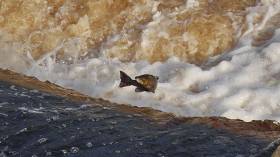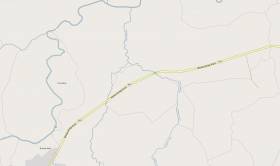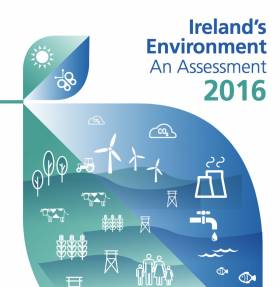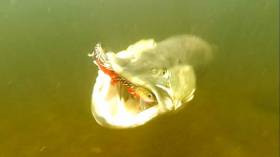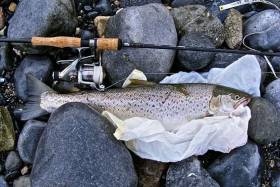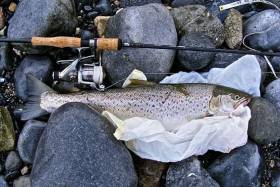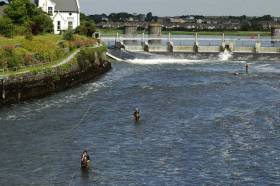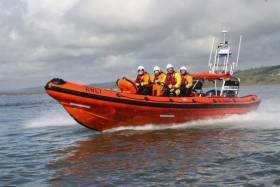Displaying items by tag: angling
Minister Announces New Sea Trout Tagging Scheme & Conservation Measures
#Angling - Sean Kyne TD, Minister of State at the Department of Communications, Climate Action and Environment, has given statutory notice of his intention to make the Wild Salmon and Sea Trout Tagging Scheme Regulations 2016 to provide for the management of the wild salmon and sea trout fishery by Inland Fisheries Ireland from 1 January 2017.
A copy of the draft regulations is available from the department website and and is also open for public inspection at the offices of the department in Cavan and at the offices of Inland Fisheries Ireland.
Any person may submit observations or objections to the draft regulations at any time during the period of 30 days concluding on 11 December 2016 either by e-mail to [email protected] or to the following address:
Inland Fisheries Division,
Department of Communications, Climate Action and Environment,
Elm House,
Earlsvale Road,
Cavan Town
H12 A8H7
Ireland
Tel: 01 6783071 / Lo-call 1890 449 900 Extension 3071
All submissions received will be published on the department's website following the conclusion of the consultation period.
Major Fish Kill On Important Salmon & Trout Waterway Near Lough Neagh
#FiskKill - Heavy rain over the weekend slowed the investigation into a fish kill on a tributary of an important salmon and trout river for Northern Ireland.
As BBC News reports, a slurry discharge in the Altagoan River near Magherafelt caused the death of a “significant” number of fish over a two-mile stretch, as discovered by local anglers late last week.
The Altagoan flows into the Moyola River, described by the Moyola Angling Club as “one of Northern Ireland’s premier salmon and dollaghan [Lough Neagh trout] rivers”.
Local fishermen say the situation is “completely devastaing” to the popular game fishery, which has had much enhancement work over the last decade.
The news comes just week after a cracked pipe led to a chemical spill and subsequent fish kill in a Co Down river, amid concerns over spikes in pollution and poaching across Northern Ireland.
Decline In High-Quality River Sites Is Wake-Up Call Says IFI Chief
#Angling - Continued vigilance on Ireland’s rivers and lakes is required, says Ireland’s inland fisheries body, as a new report indicates a substantial loss in the number of highest quality river sites.
According to the latest State of the Environment Report from the Environmental Protection Agency (EPA), only 21 sites were classified as the highest quality rivers (0.7% of sites) in most recent monitoring period (2013-2015). This compares with 575 sites between 1987-1990 and 82 sites between 2001-2003.
In addition, 18% of monitored rivers and 27% of monitored lakes were defined as ‘less than good status’ due to fish ecological status as monitored reported on by Inland Fisheries Ireland (IFI).
Preliminary assessment suggests that barriers to fish migration and physical deterioration of habitats may be partly to blame.
Between 2010 and 2012, there were also 70 fish kills reported. However serious pollution of rivers has fallen to just over 6km compared to 17km in 2010-2012 and 53km in 2007-2009.
“We need to protect our fish populations and conserve our resource for the next generation,” said IFI chief executive Dr Ciaran Byrne on the new report, adding that Ireland’s fisheries resource “is worth €836 million annually to the Irish economy and supports over 11,000 jobs often in rural and peripheral communities.
“We have over 273,000 domestic anglers currently in Ireland and in 2015, 163,000 international visitors fished here. Angling and the fisheries resource, if developed in a conservation focused manner, offers huge recreational and economic potential for Ireland now and into the future.
“We have some of the best wild fisheries in Europe and water quality in Ireland still compares favourably with our European neighbours. However, the dramatic reduction in the number of our pristine rivers is a wake-up call which we need to address.”
Inland Fisheries Ireland Sponsorship Fund 2017 Open for Applications
Inland Fisheries Ireland has launched its Sponsorship Fund for 2017 which will support angling events and initiatives across the country. The fund supported 44 events to the tune of €30,000 in 2016 with a particular focus on initiatives which help grow Ireland’s angling tourism product and support novice anglers. Angling in Ireland is currently worth €836 million to Ireland’s economy annually, supporting upwards of 11,000 jobs.
Inland Fisheries Ireland’s Sponsorship Fund aims to support large international competitions held in Ireland which showcase Ireland’s angling offering and contribute to local economies. The fund also contributes to novice angler events which increase participation in angling among those who have recently taken up fishing. Finally, it also helps initiatives which disseminate information which promote conservation and protection of the inland fisheries and sea angling resource and can include seminars, workshops and training. Support from the Sponsorship Fund can be either financial or resource support from Inland Fisheries Ireland staff members.
Angling offers rural communities the opportunity to increase the number of visitors to the area and in turn, support local business and create jobs by providing a sustainable source of income for both catering and accommodation services. Inland Fisheries Ireland’s National Strategy for Angling Development aims to increase overseas angling visits from 163,000 in 2015 to 173,000 and increase domestic participation of 273,000 anglers annually by 0.5%. If this is realised, angling could bring in an additional €53 million annually and support 1,800 jobs.
Suzanne Campion, Head of Business Development at Inland Fisheries Ireland said: “We are delighted to launch our Sponsorship Fund for 2017 which will support angling clubs and groups nationwide in delivering programmes which ultimately drive angling participation rates. There is a huge network of angling communities nationwide and we want to support them in offering local events which engage domestic anglers, overseas anglers and those who are about to cast for the first time.
Ireland has some of the best wild fisheries in Europe and as a destination, we have a unique opportunity to grow our angling tourism product. This Sponsorship Fund is just one element of our National Strategy for Angling Development which aims to develop our angling tourism potential while also managing and conserving our fisheries resource.”
Inland Fisheries Ireland’s National Strategy for Angling Development is the first comprehensive national framework which will deliver a wide-ranging set of investments, innovations and promotions over the coming five years. It aims to make angling accessible and attractive through information, infrastructure and support, to develop tourism through the promotion of the angling resource and to position angling as a key leisure and recreation pursuit. The Strategy will deliver significant economic benefits in rural communities where much of angling takes place, while also ensuring that fish populations and habitats are protected and conserved.
Applications for funding from the Sponsorship Fund are now invited from angling clubs, associations or any local group organising an angling initiative. The scheme will remain open for applications until Friday, 9th of December 2016 and all applications can be made online at www.fisheriesireland.ie/funding. Awards will be subject to budget availability and adherence to the scheme requirements.
Public Consultation On Pike Management In Wild Brown Trout Fisheries
#Angling - Inland Fisheries Ireland has launched a public consultation on the management of pike in designated wild brown trout fisheries.
It follows the IFI board’s decision to commence a review period of its policies on the management of wild brown trout, pike and bass that were initially developed in 2014.
IFI says it welcomes the opportunity to engage with stakeholders and their “diverse opinions” on the issue via their submissions, which will be reviewed and considered by the newly appointed Pike and Wild Brown Trout Policy Review Group that comprises a range of representatives from all disciplines within the fisheries agency.
“Over two years ago, we developed policies which have an impact on how we manage the pike species in fisheries which are predominately home to wild brown trout,” said IFI chief executive Dr Ciaran Byrne. “This review and public consultation period allows us to reflect on those policies and to hear from our stakeholders on their views on this issue.
“We know there are varied opinions out there and this is the chance for the public to have their say. This public consultation will help inform our future policies and work in this area.”
Information on the consultation is available from the IFI website or from any IFI office. The public consultation period will run for four weeks until 5pm on Thursday 1 December.
All submissions must be made in writing and will be published on the website. Submissions should be marked ‘Public Consultation – Pike Management in Brown Trout Fisheries’ and can be submitted by email to [email protected] or by post to:
Policy Review
Inland Fisheries Ireland
Sunnyside House
Macroom, Co Cork
Poaching Threat To Connemara Angling Tourism
#Angling - Poaching is a direct threat to efforts to revive salmon and trout angling and associated tourism in Connemara, a local business has warned.
Brian Curran of Lough Corrib-based Ireland West Angling told the Connacht Tribune that poachers are doing “untold damage to rehabilitation efforts” in Spiddal and environs, following a recent conviction of a local man for unlawful netting on the Boluisce River.
Such illegal practices disturb the painstaking work of Inland Fisheries Ireland staff and local registered fisheries to clear obstructions and place spawning gravel to aid fish in their migration.
The story comes weeks after Northern Irish anglers expressed their own concerns over poaching and pollution in the Carlingford and Lough Foyle areas, as previously reported on Afloat.ie.
NI Govt Portal Has ‘Transformed’ Fishing Permit Process
#Angling - Northern Ireland’s new online fishing permit application system has “transformed” the industry, as the Belfast Telegraph reports.
The new NI government web portal, designed by Belfast firm Kainos with BT, enables anglers and commercial fishermen to apply for a range of permits and licences with the Inland Fisheries Group via a single channel.
Underpinning the service is a “shared management information system” that means less paperwork and increased efficiency for users and local permit providers alike.
Earlier this year, all paper-based angling permits in Northern Ireland were replaced by electronic records, as previously reported on Afloat.ie.
Half-Million-Euro Fund To Improve Access To Angling
#Angling - A new fund to support projects for sustainable and accessible angling in Ireland has been launched by Inland Fisheries Ireland (IFI).
The Capital Works Fund of €500,000 is available for angling groups and clubs who are looking to improve access and infrastructure for angling.
The fund is aimed specifically at capital improvement works, with grants available to all groups and individuals including local development associations, tidy towns, angling clubs and others looking to improve access to angling.
The types of projects eligible for funding must provide for public access and include the following:
- Clearing and fencing along rivers/ lakes to allow access for angling.
- Disability-friendly angling stands.
- Car parks to improve access for anglers (new car parks and upgrades to existing carparks).
- Walkways to improve access for anglers.
- Stands, styles, footbridges and boat slips.
- Accessible angling boats.
Sean Kyne TD, Minister of State with responsibility for the inland fisheries sector, said: “Accessibility for people of all abilities is a priority if our inland fisheries are to be enjoyed by everyone.
“I welcome the investment which will open angling activity to a wider range of participants and I would encourage the community based groups to apply for funding.”
The funding scheme forms part of IFI’s National Strategy for Angling Development which aims to ensure that Ireland’s fish stocks and angling infrastructure are protected and enhanced for the economic value and recreational benefit which they offer to communities across Ireland.
The fisheries resource is worth €836 million to the Irish economy annually and supports upwards of 11,000 jobs, often in rural and peripheral communities.
IFI head of business development Suzanne Campion added: “We are now inviting applications for funding for ‘shovel-ready’ projects which will improve access to angling.
“This is a vital step in developing facilities for the 273,600 anglers currently in Ireland and the 163,000 international visitors who fished here in 2015. By improving access, we can help grow domestic participation in angling and encourage more visitors to our country every year.”
Campion said the National Strategy for Angling Development “aims to grow the annual economic contribution of angling by €96 million over the next five years, creating an additional 1,800 jobs and attracting 40,000 more tourists annually.
“We are calling on angling development groups to apply for funding through this scheme. Together, we can ensure our angling infrastructure is developed and we can help remove any barriers to participating in this valuable activity.”
Applications for funding should be submitted via the online application form.
Applications will be evaluated in light of the objectives of IFI’s National Strategy for Angling Development, which aims to make angling accessible and attractive through information, infrastructure and support, to develop tourism through the promotion of angling and to establish recognition of angling as an important leisure and recreational pursuit. The closing date for applications is Tuesday 8 November.
IFI said it expects to continue funding in this area in 2017, and invites expressions of interest (open till the end of November 2016) from those wishing to develop more complex projects to deliver on the National Strategy for Angling Development.
Galway Anglers Voice Opposition To Proposed City Ban
#Angling - Galway anglers are mounting a protest against proposals to ban fishing in public spaces around the city, as the Connacht Tribune reports.
Both the Galway Bay Sea Angling Club and Galway City Salmon Angling Association have written separately to Galway City Council expressing their opposition to a draft bye-law that would prohibit angling “in any part of a park or open space” without prior written permission.
This would include areas popular with anglers such as Ballyloughane, Silverstrand and Blackrock, as well as the ‘high bank’ between the Salmon Weir and O’Brien’s Bridge in the city centre.
Anglers argue that any such ban on fishing in Galway would be costly to the economy that hinges on the sport, from tourism to the city’s tackle shops.
The Connacht Tribune has more on the story HERE.
Youghal Lifeboat Launches To Man Taken Ill On Angling Boat
#RNLI - Youghal RNLI’s volunteer lifeboat crew were tasked yesterday morning (Saturday 15 October) in choppy waters to reports of a man taken ill on board a chartered angling vessel.
At 11.30am the lifeboat launched to the location around a mile and a half off Capel Island, where the casualty had been unconscious for a period and was pale in appearance.
The lifeboat crew proceeded to administer casualty care when they recovered the casualty on board.
An ambulance was also requested and was awaiting the lifeboat on its return to station, where the paramedics checked the casualty over before giving him the all clear.
Commenting on the callout, Youghal RNLI lifeboat Helm John Griffin said: “[The charter vessel operators] did the right thing in contacting us when the man became unwell.
“It’s always better to get an ill person medically checked out if there are any concerns.”



























